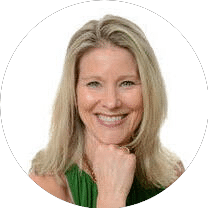Like many health coaches before me, I entered the holistic nutrition world in an attempt to solve my own personal mysteries surrounding chronic allergies, stomach upset, and related anxiety. I entered and completed a nutrition certification and then spent several years practicing as a health coach.
During this time, my overall health continued to greatly improve. Yet as I learned more about integrative health, I wanted to deepen my knowledge and gain additional information and tools for myself and my clients. My curiosity led me to positive psychology, and to WBI certification in Wholebeing Positive Psychology and Positive Psychology Coaching.
While traditional therapy focuses on looking at a client’s life through the lens of the rearview mirror, a Positive Psychology Coach looks forward, towards the client’s potential and goals. How is this applicable to coaches supporting their clients’ health and wellness? Here’s how the field taught me how to take my health coaching—as well as my own health—to the next level.
Coaching Approach
Positive psychology teaches that we are whole, resilient, and capable of designing our own path toward meeting our goals and aspirations. Coaches are encouraged to ask the right powerful questions, develop good listening skills, and use a solutions (not problem-focused) approach to achieving these goals. Coaches are also taught to help a client explore their motivation and values, and learn from what has worked best for them in the past. Coaches help build confidence around a client’s developing skills, and help them to achieve the changes they are seeking.
Coaching questions I might ask:
- At what point in your life did you feel the best—in mind, body, spirit—and what were you doing at that time to feel this way?
- If you had a magic wand, and everything that you wanted to achieve had come true, what would your life look like?
- If you were to move just 2% forward into being more mindful, or curious, or resilient, what would you be doing on a daily basis?
Introduction to Valuable Research
The interest and research in positive psychology has grown tremendously over the past few decades, with several concepts remaining a solid foundation for the coaching process. A positive psychology approach is primarily future focused, with an emphasis on helping a client define and choose to develop their “best possible self.” WBI’s SPIRE model of integrative health offers a guide to achieving a whole-picture view of current and aspirational selves by honing in on how we are doing in the Spiritual, Physical, Intellectual, Relational, and Emotional aspects of life. Another important concept, introduced by Stanford professor Carol Dweck, revolves around a focus on developing a growth mindset—the belief that talents, abilities and intelligence can be developed through hard work and good strategies at any point in life. The emphasis is on choice and perspective, or working on improving the personal lens we are looking through in life.
Coaching questions I might ask:
- Picture yourself 10 years into the future. Everything has gone as you would have liked and you have reached your goals. What are you doing? What is good about your life?
- Rate yourself on a scale of 1 to 10 on the SPIRE scale, with 1 being “not at all,” and 10 being “most of the time.” Let’s discuss our findings.
- Think of a recent challenge you faced personally or at work. In what ways did you adopt a fixed mindset and in what ways did you experience a growth mindset?
Tools and Exercises
I found numerous tools and exercises that were available to me to assist clients in reaching their goals. One such tool my clients complete is the Values in Action (VIA) Character Strength survey. The focus on clients as capable and whole lends itself to exploring what is especially good about that person. Strengths such as curiosity, creativity, teamwork, perseverance, and hope are often engaged to help a client succeed. One of my favorite strategies is “strength spotting,” noticing what strength is being engaged and how it is helping in a certain situation. Another strategy is focusing on what ways a client might engage in boosting positive emotions: maybe through listening to uplifting music or podcasts, taking a walk in nature, learning a new skill or hobby, or visiting with a friend. Another favorite strategy is focusing on the quality of relationships. Expressing gratitude and appreciation to someone who is special or has helped you recently can be a powerful way to strengthen a relationship.
Coaching questions I might ask:
- Name your top five character strengths from the VIA survey. Which strength has been especially strong during the past week?
- What activities do you do weekly that bring you joy? How can you do more of these activities?
- Would you be willing to write one “gratitude text” each day this week to someone whom you appreciate or love?
As I began integrating these concepts into my coaching engagements and presentations, I noticed an increase in confidence in myself and my skills—I had so much more to share when speaking with individuals, groups, organization, and corporations. The benefits of adding positive psychology strategies, tools, and resources into your health coaching practice are innumerable, and will make your life and your work as a coach easier and more rewarding.
Join Sandy in the Wholebeing Happiness for Coaches course.

Sandy Campbell
Sandy Campbell, a 2018 CiWPP graduate, is a Health and Wellness Coach, and holds an MS in Counseling from Villanova University, a degree from the Institute of Integrative Nutrition, and a 200-hour yoga teacher training certification. After working for 10-plus years for a major pharmaceutical company, Sandy decided to step out of the corporate world and focus on improving her health, quality of life, and happiness. Her passion evolved into helping others meet their full potential through small but highly impactful dietary and lifestyle shifts. Focusing on nutrition, stress management, and positive psychology, Sandy works with clients in person and remotely; leads corporate wellness workshops for businesses and organizations, including the Federal Home Loan Bank of Pittsburgh, Mylan Pharmaceuticals, and the Community College of Allegheny County; and leads on-site and online programs, including her 11-Day Pure Energy Program, a clean eating boot camp. Sandy is Facilitator for the Wholebeing Happiness for Coaches course. Learn more at sandycampbell.net or on Facebook at Sandy Campbell Wellness.



Hi Sandy,
Great article! It does an amazing job of weaving powerful research (McGonigal’s and Dweck’s work) into the overall fabric of positive psychology. Your personal journey is inspirational. I look forward to exploring your 11-Day Pure Energy Program.
“Hats off to you and your empowering work!”
Sincerely,
Pamela Bond
Author of The Authenticity Compass